As long as there have been countries there have been tensions with the neighbors. Sometimes this leads to war, other times to peaceful negotiation. And sometimes the conflict leads to giant boundary walls. These are the most influential and the most intimidating.
只要有国家,就会有邻国间的分歧。有时候这种分歧会引发国家间的战争,但有时候也会和平协商解决。还有另一种情况——这些冲突会促使国家间建起巨型界墙,这才是影响最深、最可怕的后果。
10.Korean Demilitarized Zone
10.朝韩非军事区
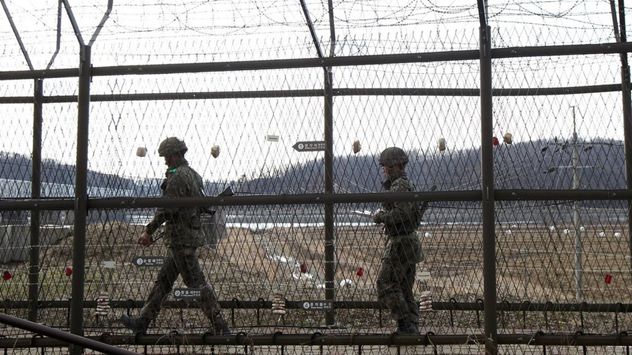
With the 1953 ease-fire that halted the Korean War, both sides agreed to split the peninsula at the front lines. This of course gave us North and South Korea. It was agreed that there would be a roughly two and a half mile buffer zone between the two where there would be no military fortifications. It's appropriately called the Demilitarized Zone, and it's currently the most fortified international border in the world. All along each half of the roughly 150 mile line is a constant string of outposts, fortifications and garrisons protecting against any possible act of hostility. The zone is virtually uninhabited except for two villages — Daesong-Dong on the south side, and Kjong-Dong on the north side. Kjong-Dong is the only village in North Korea visible from the south. However, it's clearly just a propaganda village, as all the buildings are nothing more than hollow shells that lack windows and interiors.
1953年战争双方停火标志着朝鲜战争的结束,双方就以战争前线地区为界,划朝鲜半岛为两部分的问题达成一致。这就有了现在的韩国和朝鲜。朝韩双方都同意划出大约2.5英里(约3.2千米)的地区作为缓冲带,也就是说该区域内将不会有军事设施。这一区域又称为非军事区,出于防止敌人入侵的考虑,沿着缓冲带大约150英里(约241千米)长的区域两侧有常驻哨站、防御工事和边防军。整个地域内,只有作为朝鲜半岛南北两方国土界限标志的两个小村庄——韩方的壹城洞村和朝方的机井洞村。从南边往北望,机井洞村是唯一一个能看得见的朝鲜村庄。但它明显仅仅是一个军事宣传村——村里所有的建筑都是些空壳子,没有窗户更没有家具之类的东西。
Also within the zone is the famous village of Panmunjom. There are no permanent residents there, as it serves as a meeting place between the two sides. The border actually runs through the buildings where the two sides meet. It even runs right down the middle of the conference table so the sides can stay on their half. The DMZ has evolved into a dual purpose barrier. Initially its sole purpose was to protect each side from invasion, but as conditions in North Korea got worse the North beefed-up security on their side to ensure defectors wouldn't be able to cross. A minor bright spot is that since the zine is virtually uninhabited it's become a de facto wildlife sanctuary. Many species which were endangered have suddenly been able to thrive without humans around.
著名的板门店村也在该区域范围内,作为朝韩的谈判场地,板门店村内没有永久居民。朝韩的南北分界线刚好穿过双方的谈判场所,双方为了确保谈判都在自己的势力范围内,谈判桌也被置于分界线的正中位置。这个非军事区已经发展成为具备双重用途的边界缓冲带。起初,分界线的唯一目的是避免朝韩双方遭受过界侵略。随着朝鲜局势越来越严峻,为了确保国土安全,朝鲜在该分界线属于朝鲜的那侧加强了军事防御。幸好由于这一地区无人居住,各种野生动物可以在这里安营扎寨。没有人的打扰,许许多多濒临灭绝的物种在此重新开始迅速繁衍。
9.Melilla and Cueta Border Fences
9.梅利利亚和休达的边界围栏
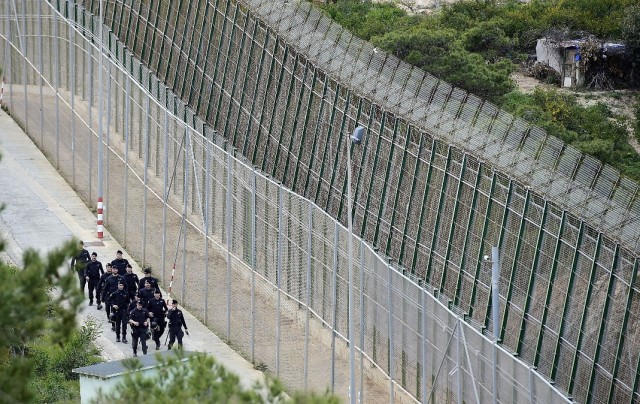
These two cities are Spanish enclaves along the Moroccan coast. It's the only land in Africa fully governed by a European nation, although Morocco has never recognized the independence of these two cities and has formally stated that both belong to them. They've also long been popular embarkation points for illegal immigrants and smugglers hoping to reach Europe.
梅利利亚和休达是摩洛哥海沿岸的两个西班牙飞地。尽管摩洛哥从未承认过梅利利亚和休达的主权独立,甚至还发表官方声明声称这两个自由市是属于摩洛哥的领土,但它们确实是非洲大陆上仅剩的隶属欧盟管辖的领土。长期以来,许多非法移民和走私者都想偷渡至欧洲,而这两个城市就是倍受青睐的登陆地点。
Due to these factors, formidable fences were built to protect each city. There are two parallel fences spaced about 20 feet apart, each one 20 feet high and topped with razor wire. The Melilla barrier is approximately seven miles long, and the Cueta approximately five. They're easily monitored and patrolled, and both are lit up constantly at night. The European Union aided in the funding in the hope that it would deter illegal activity. Both have so far proven to be effective barriers, but they've increased tensions with Morocco, especially after 15 people died in a failed attempt to cross in 2005.
出于对上述情况的考虑,为了保护这两座城市,人们筑起了巨大的边界围栏。两道平行的围栏,相隔约20英尺(约6.6米),高约20英尺(约6.6米),围栏顶上设有铁丝网。梅利利亚侧的边界带长约7英里(约15千米),休达一侧长约5英里(约8千米)。两边都有巡逻和监视的士兵,整晚灯火通明。欧盟则指望着能通过对梅利利亚-休达地区提供资金支持,以达到阻止该地区不法活动的目的。事实证明,这两道平行的边界围栏都起到了预想的作用,但同时它们也使得两个自由市与摩洛哥的关系更加紧张,尤其是2005年,15人因企图穿越边界围栏而丧生。
8.马其诺防线
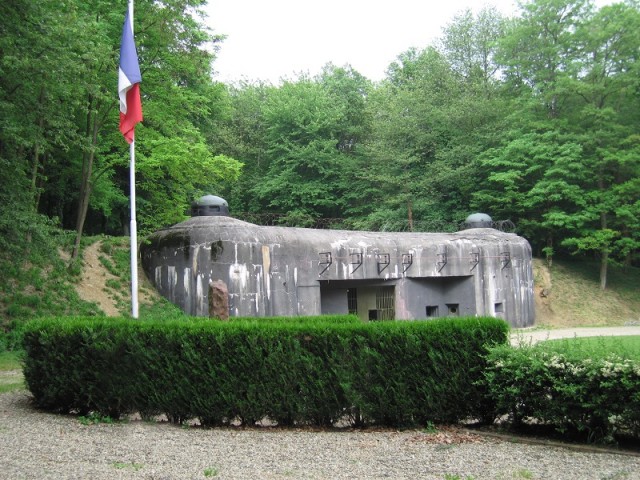
Shortly before World War II France justifiably feared invasion from Nazi Germany. Since northeastern France borders Germany, they dedicated a disproportionate amount of military resources to fortifying that border. All along the Maginot Line they built an elaborate series of bunkers, vehicle traps, guard towers and other fortifications strategically placed to make an invasion from the powerful German military very difficult.
法国东北部与德国接壤,二战爆发前法国十分担心遭到纳粹德国入侵,因而投入了过多的军备资源来加强边防建设,建成了造价昂贵的马其诺防线。防线内部拥有许多精心建造的壕沟、电车轨道、守卫塔以及其他防御工事,试图以此抵御强大的德国军队入侵。但德军避开了马其诺防线,从比利时西部侵入,而后从法国北部入境。
Germany solved this problem by simply invading Belgium to the west and then entering France from the north. With so many of their military resources devoted to a now worthless barrier, France fell in just a few weeks. Many remnants of the Maginot line still exist today. After all, none of them were ever damaged in battle!
由于大部分军事力量都投入到了这个几乎毫无价值的防御壁垒上,法国在短短几周之内就沦陷了。马其诺防线的残躯一直留存至今,毕竟其并未经受战火的洗礼呀!
7.柏林墙
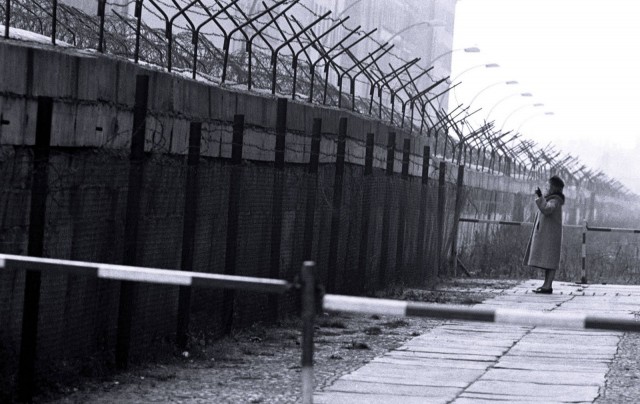
The Berlin Wall is perhaps the most famous installment on this list, mainly because it was a literal symbol of the Iron Curtain. Its purpose wasn't to keep its enemies out, but rather its own people in. Built initially in 1961 as a single makeshift wall, it eventually evolved into the behemoth that's most familiar to the public.
柏林墙或许是本榜单上最著名的建筑,大半因其是“铁幕”的代名词。修建的目的不在于抵御外敌,而在于阻止民众外逃。柏林墙始建于1961年,最初仅是铁蒺藜围成的路障,后来才逐渐演变成人们所熟悉的庞然大物。
After World War II the allies divided Germany into four sections. As the capital and largest city, Berlin was also divided. West Berlin became a democratic enclave surrounded completely by communist East Germany. Between 1945 and 1961 there was no physical boundary between the two sections. West Berlin had been rebuilt into a thriving modern metropolis, while East Berlin was drab and still full of ruins from the war. Fed up with this existence and the restrictive nature of the communist government, many East Germans simply walked into West Berlin and established a new life there. East German officials realized that this would make their country unsustainable, so they hastily built the wall and posted guards with orders to shoot anyone attempting to cross. Since the structure was still fairly simple many attempted the crossing anyway. Most were successful, but some were killed in the process. With each escape upgrades were made until it became two walls separated by roughly 100 feet. Between the two walls was a zone ominously known as the death strip, a barren stretch of sand filled with landmines, vehicle traps and guard towers. Anyone caught there was shot on sight. The Berlin Wall went right through residential and commercial areas. It literally cut through buildings, down the middle of streets… even a church was left right in the middle of the death strip. Berliners were separated by less than half a football field but were a world apart. There were some escapes over the years. Most involved creative ways to get over or under the wall, or through the checkpoints — getting through the barricade itself was nearly impossible. In 1989, when East German officials announced that travel restrictions would be reduced, Berliners on both sides of the wall took that statement literally and started destroying it. Within just a few weeks the massive structure was completely gone. There are a few memorial remnants, but Berliners hated it so much they simply couldn't get rid of it quickly enough.
二战以后德国被苏美英法四国分为四区占领,柏林作为德国的首都和第一大城市也被分割。西柏林完全被共产主义的东德所包围,成为了联邦德国的飞地。在1945年到1961年间,东德和西德之间尚且没有实质的界限。而正当西柏林被改造成一个繁荣的现代化大都市之时,东柏林却是满目疮痍,一片废墟。许多东德的民众受够了这样的生活状况,又十分反感所谓的共产主义政府强加的诸多限制,便移居到西柏林开始新生活。东德的领导者们意识到如果放任不管,大规模的人员流失将会影响政权的稳固。因而他们急速修建了柏林墙,并指令守卫部队可以即刻击毙任何试图越墙的人。起初墙体的构造相当简单,依旧有许多人试图翻越围墙并且取得了成功,但也还是有一些在半路被狙杀。伴随着每一次的加固,柏林墙最终演变成两堵相距约100英尺(约30米)的高墙。两墙之间是令人闻风丧胆的“死亡地带”,宽阔的无草皮空地地雷密布,反车辆壕沟和瞭望塔随处可见,越墙者一经发现当场击毙。柏林墙贯穿住宅和商业区,它竟硬生生穿越建筑物,横亘在街道中央,甚至有一座教堂恰好被遗留在死亡地带中间。东西柏林人相距不过半个足球场,但其生活确有着天壤之别,仿佛这一墙之隔便是另一个世界。多年来不断有人逃脱,人们绞尽脑汁想尽各种办法试图成功翻越高墙,抑或是顺利通过检查站——因为直接翻越柏林墙毫无成功可能。直到1989年,东德宣布取消东西柏林之间的禁制通行的命令,开放柏林墙。墙内外的人们都欢呼雀跃,开始拆毁这座高墙。仅仅几周之内,这座庞然大物便被“灰飞烟灭”。即使尚余些许纪念物,柏林人也厌恶之至,避之不及。
6.哈德良长城
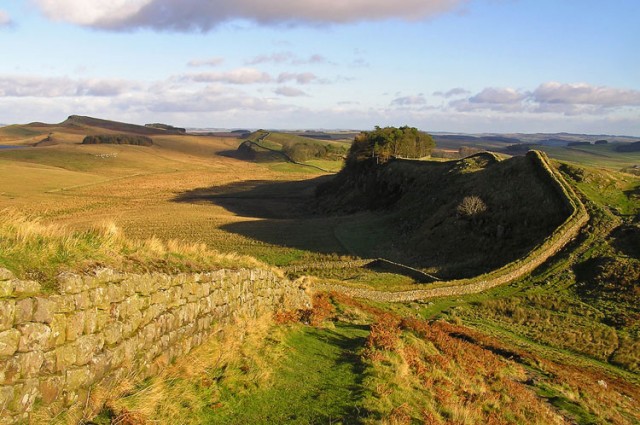
By the early 2nd century the Roman Empire had expanded to include most of the island now known as Great Britain. In preparation for a visit from Emperor Hadrian, local officials and military leaders decided they weren't willing to risk an invasion from northern barbarians, so they constructed a wall approximately 80 miles long from the North Sea to the Irish Sea. Finding suitable materials in the barren landscape was no easy task, so it was primarily constructed from stone and earthen mounds. There were garrisons and outposts strategically placed along the route. It was arguably the most successful barrier on this list, as there were no breaches. However, most historians agree that there was never really a serious threat either. Today it's Northern England's most visited tourist destination.
公元2世纪初,罗马帝国的疆域已扩张到了我们现在知道的大不列颠。在准备迎接哈德良皇帝到大不列颠视察的工作时,当地官员和军事领导人因不愿意冒险抵抗北方野蛮人的入侵,所以他们决定建一堵跨越北海和爱尔兰海,长约80 英里(约129千米)的城墙。在贫瘠的土地里找到合适的建筑材料不是一件容易的事,所以这座城墙主要由石头和泥土堆成,并战略性地安排了驻军和哨兵驻扎在城墙沿线。在这十大隔离墙中,它可以说是保存得最好的城墙,几乎没有遭到破坏的痕迹。不过,大多数历史学家认为,这大概也是从来没有遇到真正严重威胁的缘故。现在它可是英格兰北部客流量最大的旅游胜地喔!
















